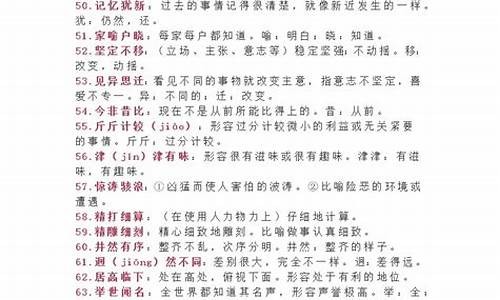您现在的位置是: 首页 > 成语教学 成语教学
bothersome fly-bothersome
tamoadmin 2024-10-21 人已围观
简介bother[5bRTE(r)]vt.烦扰, 打扰vi.烦恼, 操心n.麻烦, 烦扰v.打扰annoy concern fuss trouble worry bother早期为 bodder<古爱尔兰语 bodar 麻烦[5bRTE(r)]vt, vi打扰;烦扰Will it bother you if I turn the television on?我开电视会不会吵着你?I‘m busy

bother
[5bRTE(r)]
vt.烦扰, 打扰
vi.烦恼, 操心
n.麻烦, 烦扰
v.打扰
annoy concern fuss trouble worry
bother
早期为 bodder<古爱尔兰语 bodar 麻烦
[5bRTE(r)]
vt, vi
打扰;烦扰
Will it bother you if I turn the television on?
我开电视会不会吵着你?
I'm busy, don't bother me.
我正忙着,不要打扰我。
I'm sorry to bother you, but can you direct me to the railway station?
劳驾,你能不能告诉我到火车站怎么走?
(常与about, with, to连用)麻烦
Don't bother with/about it.
别为此操心。
Don't bother about it.
不用麻烦了。
Don't bother yourself about me.
别为心。
Don't bother about answering his letter.
你不必回复他的信。
We had a lot of bother in repairing the press machine.
修理这台印刷机费了很大劲。
(表示不高兴的强调用语)
Bother the lot of you!
你们这些人真讨厌!
Bother it!
讨厌!
bother
n
麻烦;焦虑
We had a lot of bother finding our way.
我们经过很多麻烦才找到这里。
The guests had a lot of bother finding their way here.
客人们费了很大劲才找到这里。
暴行;恫吓
annoy concern fuss trouble worry
bother
[5bCTE]
n.
麻烦; 烦恼
麻烦事; 讨厌的人
焦虑
费工夫的工作
We had a lot of bother finding our way to his house.
我们费了很大劲才找到他的家。
Don't get into such a bother about small matters.
不要为了区区小事而如此焦虑。
Gardening takes more bother than it's worth.
种花是很费工夫的, 真不值得。
bother
vt.
打扰, 使不安, 使激动或紧张
使迷惑; 使烦恼、生气或担心
纠缠
Don't bother me while I am taking my nap.
我小睡的时候不要打扰我。
The complexities of life bothered me.
生活的杂乱事儿使我心烦。B-it! (=B-you!)讨厌!
bother
vi.
感到轻微的关切或焦虑
麻烦
费心
bother with trifles
为小事而烦恼
botherer
n.
botherment
n.
bothersome
adj.
bother (oneself) about (=bother one's head about)
为...而操心; 为...而费事
见 annoy
bother
AHD:[b糦搮r]
D.J.:[6b%H*]
K.K.:[6b$H+]
v.
both.ered; both.er.ing; both.ers;
bother
v.tr.
To disturb or anger, especially by minor irritations; annoy.
See: annoy
To make agitated or nervous; fluster.
To make confused or perplexed; puzzle.
To intrude on without invitation or warrant; disturb.
To give trouble to:
a back condition that bothers her constantly.
bother
v.intr.
To take the trouble; concern oneself.
To cause trouble.
bother
n.
A cause or state of disturbance.
bother
interj.
Used to express annoyance or mild irritation.
Probably fromdialectal bodder
[ possibly of Celtic origin ]
bother
AHD:[b糦搮r]
D.J.:[6b%H*]
K.K.:[6b$H+]
v.
both.ered; both.er.ing; both.ers;
bother
v.tr.
To disturb or anger, especially by minor irritations; annoy.
烦扰,激怒打扰或激怒,尤指通过令人烦躁的小事;打搅
See: annoy
To make agitated or nervous; fluster.
使紧张使不安或紧张;使慌张
To make confused or perplexed; puzzle.
使迷惑使混乱或迷惑;使窘困
To intrude on without invitation or warrant; disturb.
干扰没有被邀请或授权而闯入;打扰
To give trouble to:
给…添麻烦:
a back condition that bothers her constantly.
一个不断给她添麻烦的不利条件
bother
v.intr.
To take the trouble; concern oneself.
烦;操心
To cause trouble.
使麻烦
bother
n.
A cause or state of disturbance.
干扰干扰的原因或状况
bother
interj.
Used to express annoyance or mild irritation.
用于表达烦恼或轻度恼怒
Probably fromdialectal bodder
可能源自方言 bodder
[ possibly of Celtic origin ]
[ 可能源于凯尔特语 ]
英语高手请进(追加)
一、trouble you
trouble
英 [?tr?bl] 美 [?tr?b?l]?
n.麻烦;故障;烦恼;
vi.烦恼;费心
vt.麻烦;使烦恼;折磨
We have supposed we will not trouble you again.?
我们认为我们不会再麻烦你了。
二、bother you
bother
英 [?b(r)] 美 [?bɑ:?(r)]?
vi.麻烦;烦恼;操心
n.麻烦,操心;累赘;烦扰,吵闹;讨厌的人
打扰你、麻烦你
1、I'm really reluctant to bother you.?
实在不落忍麻烦您。
2、I'm sorry to bother you. I should've called first.?
很抱歉打扰你,我该先打个电话。
扩展资料
词义辨析:
bother,disturb,trouble,annoy,irritate,vex这些动词均有使人不安或烦恼、麻烦之意。?
1、bother 指使人烦恼而引起的紧张不安或感到不耐烦。?
2、disturb 较正式用词,多用被动态。指拢乱,使人不能平静或妨碍别人工作、思维或正常秩序,是程度较深的烦恼。?
3、trouble 指给人在行动上带来不便或在身心上造成痛苦。?
4、annoy 强调因被迫忍受令人不快、讨厌的事而失去平静或耐心,多指一时的打拢或恼怒。?
5、irritate 语气比annoy强得多,指激怒,使发怒,多指一种短时间的反应。?
6、vex侧重指因不断的干扰而引起的烦恼,有时含激怒的意味。
形容词的后缀有哪些?
常用英语前缀
Ⅰ.前缀re-
re-是最常用的前缀之一。它可以加在名词或动词前面,构成新的名词或动词。re-表示以下三方面的意义:
1.表示"回"或"向后"的意思。例如:return(回来,返回)recall(回忆,召回)retract(缩回,取回)
2.表示"再"、"重新"、"重复"的意思。例如:review(复习)reunion(团圆,重聚)restart(重新开始)reconstruction(重建)
3.表示"相反"、"反对"的意思。例如:rebel(反叛,谋反)reverse(反转,颠倒)resist(反抗,抵抗)
Ⅱ.前缀de-与dis-
前缀de-来自拉丁语,意为"away from",所以这个前缀的意义之一就是"离开"、"出"。它构成的词有一定规律性,常表"离开"这一深层概念,而且常与介词from等搭配,例如:dethrone(废黜)
deport(驱逐出境)deduce(推断) derail(脱轨)
Delete his name from the list of members.把他的名字从成员名单上除去。
The train will depart from platform 2.这列火车将从2号站台发车。
另外,前缀de-还表示"除去"、"取消"以及"否定"、"非"、"相反"的意思。例如:decamp(撤营)decode(解码)deforest(砍伐森林)decolonize(非殖民化) devaluation(贬值)
He has been degraded from public office.他已经被解除公职。
He descended from his taxi.他下了出租车。
前缀dis-与前缀de-同源,也来自拉丁语,原义为apart"分开"。dis-具有"不"、"无"的意思,所以加在某些动词或名词前构成反义词。例如:dishonest(不诚实的)disappear(不见,消失)
disorder(无秩序,混乱)
dis-还表示"取消"、"除去"以及"分开"、"离"、"散"的意思。由这些意义构成的词常与from等搭配。例如:
He discounted 15%from the price of a car.他把汽车价格打八五折。
Don'tdistracthis mind from his work.不要分散他工作的注意力。
另外,dis-也可表示"相作"或加强意义,由它构成的词也常与from等搭配,下面例子都表示"相作"。
disappear from the view 消失不见
He was discharged from hospital.他出院了。
Ⅲ.前缀in-及im-,il-,ir-
它们像同胞四兄弟,都是表示否定的前缀。表示"不、无、非"等否定意义。
1.以字母b,m,p开头的单词,其否定前缀为im-。例如:imbalance(不平衡的)immoral(不道德的)impossible(不可能的)
2.以字母l开头的单词用il-;以字母r开头的单词用ir-。例如:illegal(不合法的)illogical(不合逻辑的)irregular(不规则的)irrelative(无关系的)
3.以其他字母开头的为in-。例如: inhuman(不人道的)injustice(不分开的)inseparable(不可分的)incorrect(不正确的)
Ⅳ.前缀ex-
ex-有两个意义:
1.表示"出"、"外"、"由……中弄出"。例如:export(出口,输出)extract(抽出,拔出)expel(逐出,赶出)
2.表示"前任的,以前的"。例如: ex-president(前任总统)ex-soldier(退伍军人)ex-husband
(前夫)
Ⅴ.前缀anti-
anti-表示"反对"、"相反"或"防止"。例如:antiwar(反战的)anti-colonial(反殖民主义的)antifat(防止肥胖的) antimissile(反导弹)
Ⅵ.前缀macro-与micro-
macro-与micro-是一对意义相反的前缀,macro-表示"宏、大";micro-表示"微"。例如:macroworld(宏观世界) macroeconomics(宏观经济学) macroscale(大规模)microscope(显微镜)microworld(微观世界)microele- ment(微量元素)
Ⅶ.前缀trans-
trans-有两个意义:
1.表示"转变"、"变换"。例如: transport(运输---从一地转到另一地) transplant(移植)translation(翻译---从一种语言转为另一种语言)trans- form(使变形,改造)
2.表示"超过"、"横跨"、"超"。例如:transcentury(跨世纪)transnational(跨国的)transcontinental(横跨大陆的) transatlantic(横跨大西洋的)
Ⅷ.前缀tele-
tele-表示"远距离的,远"。例如: telescope(望远镜)telegram(电报) telecamera(电视摄影机,远距离摄影机)
Ⅸ.前缀super-
super-表示三种意义:
1.表示"超"、"超级"。例如:super- highway(超级公路)superpower(超级大国)supermarket(超市)
2.表示"上"。例如:superstructure(上层建筑)supervise(监督---由上面注视)superimpose(放在……上面)
3.表示"过度"、"过多"。例如:su- perheat(过热)supersensitive(过度敏感) supernutrition(营养过剩)
常用英语后缀
Ⅰ.后缀-able与-ible
形容词后缀-able与-ible是同义后缀,加在动词后,使动词变为形容词,其意义相当于情态动词 can +此动词被动式。所以在语义上有被动意义。例如:
The results can be tested.→The results are testable.这些结果是可测试的。
究竟哪些动词加-ible,哪些加-able呢?
1.加-ible的词大多数来自拉丁语。下面加-ible的词都是来自拉丁语的动词。如:edible(可食用的) visible(可见的)sensible(可觉察的)possible(可能的)flexible(易弯曲的)
2.以-mit结尾的动词,将-mit变为-miss再加 -ible。如:permit→permissible(可允许的)
3.以-nd结尾的动词,将-nd变为-ns再加-ible,如:respond→responsible(有责任的),defend→defensible(能防御的)
4.加-able的动词远比加-ible的多,且-able为活性后缀,如要构成这一意义的新词时,都是加 -able。
5.一般以"e"结尾的动词,去掉"e"再加-able。如:erase→erasable(可擦掉的),deceive→deceivable(可欺的)
也有直接加的,如:change→changeable(可变化的),service→serviceable(有用的)
6.动词以辅音加y结尾,y变i加able。如:deny→deniable(可否认的),rely→reliable(可靠的)
Ⅱ.后缀-ize(-ise)
后缀-ize(-ise)可以加在名词或形容词的后面构成动词,表示"照……样子做"、"按……方式处理"、"使成为……"、"变成……状态"、 "……化"的意思。例如:dramatic(戏剧的)→dramatize(改编成剧本), modern(现代的)→modernize(现代化),organ(组织)→organize(组织起来),civil(文明的)→civilize (使文明,变为文明),system(系统)→sys- temize(系统化),normal(正常的)→ normalize(使正常化),equal(平等的)→equalize(使平等,使相等)
注意某些以-y结尾的词,加 -ize(-ise)后缀时,要去掉-y再加-ize(-ise),例如: sympathy(同情心)→sympathize(同情,表同情)
Ⅲ.后缀-ful,-ous,-ent,-ant后缀-ful,-ous,-ent,-ant均为形容词后缀。可以直接加在动词或名词的后面构成形容词。一般来说,动词加后缀-ful,-ous,-ent,-ant构成的形容词表示主动意义。
-ful表示"富有……的","充满……的","具有……性质的","易于……的"或"可……的"。例如: powerful(有力的)peaceful(和平的)shameful(可耻的)helpful(有帮助的)forgetful(易忘的)
-ous表示"如……的","有……性质的","有……的"或"属于……的"。例如:envious(羡慕的;妒嫉的)dangerous(危险的)famous(著名的)barbarous(野蛮的)monstrous(怪异的,畸形的)
-ent表示"具有……性质的"或"关于……的"。例如:dependent(依赖的)confident(自信的)apparent(明显的)innocent(无罪的,天真的)frequent(屡次的)
-ant表示"属于……的"或"具有……性质的"。例如:tolerant(能容忍的)assistant(辅助的)ascendant(上升的)accordant(和谐的,一致的)
Ⅳ.后缀-ee
后缀-ee属名词后缀,有较强的构词能力,它不但能加在动词后面构成名词,也可以加在某些形容词或名词后面构成名词。其构词的特点可归纳为以下几点:
1.加在许多及物动词后面构成名词,表示含有被动意义的"受动者",这类名词也称作"被动性名词"。例如:trainee(接受训练者) employee(雇员) appointee(受任命者)expellee(被驱逐者)addressee(收件人)toastee(接受祝酒者)detainee(被拘留者) inter- viewee(被采访者)
2.加在某些不及物动词后构成名词,表示含有主动意义的"施动者",即执行某动作的人。一般说来,这类动词没有加后缀-er或-or的形式。例如:returnee(归国者)escapee(逃亡者)embarkee(上船者)meetee(参加会议者)refugee(难民)divorcee (离婚者)
值得注意的是,如果这个词以不发音的-e结尾,这时只加一个-e即可。如:advise- advisee(被建议者)invite-invitee(受邀者) retire-retiree(退休者)
Ⅴ.后缀-er,-or,-ar
在表示"人"的这个意义上,它们像三姊妹。例如:banker(银行家)teenager(13-19的青少年)actor(男演员) translator(翻译者) governor(总督)scholar(学者)liar(撒谎者) beggar(乞丐)pedlar(小贩)
Ⅵ.后缀-ism与-ist
是一对意义相关的后缀。它们最基本的意义是"……主义"和"……主义的(者)"。例如:materialism(唯物主义)optimism(乐观主义)materialist(唯物主义者)naturalist(自然主义者)
厌烦的英语怎么说
1、-faction
(名词后缀)表情况、状态、行为:satisfaction 满意
2、-fic
(形容词后缀)...的:scientific 科学的
3、-ful
(形容词和名词后缀)充满的,有···性质的:skillful 熟练的;handful 一把;hopeful 有希望的
4、-fy
(动词后缀)使得,使···化:satisfy 使满意;successful 成功
5、-hood
(名词后缀)表性质、状态:childhood 童年;neighbourhood 四邻
6、-less
(形容词后缀)不,没有;hopeless 没有希望的;sleeplosa 失眠的;stainless 无瑕疵的
7、-ly
(形容词和副词后缀)···的,每···的,···地:friendly 友好的;daily 每天的;carefully 小心地;conveniently 方便地
扩展资料:
单词解析:
一、satisfaction
1、读音:英?[?s?t?s'f?k?n] 美?[?s?t?s'f?k?n]?
2、翻译:n.?满意;赔偿;乐事;妥善处理;确信
3、例句:Your satisfaction is guaranteed.
包你满意。
二、scientific
1、读音:英?[?sa?n't?f?k] 美?[?sa?n't?f?k]?
2、翻译:adj.?科学的
3、例句:We all support his scientific research.
我们都支持他的科学研究。
三、skillful?
1、读音:英?['sk?lf?l] 美?['sk?lf?l]?
2、翻译:adj.?熟练的;灵巧的
3、例句:His skillful manipulation vivified this puppet.
他熟练的操作让木偶栩栩如生。
四、hopeless
1、读音:英?['h?pl?s] 美?['ho?pl?s]?
2、翻译:adj.?没有希望的;绝望的;无可救药的
3、例句:Things are so difficult that it seems hopeless.
事情是这样的困难,宪政是没有希望的了。
五、friendly?
1、读音:英?['frendli] 美?['frendli]?
2、翻译:
adj.?友好的;友善的
adv.?友好地
3、例句:The meeting is gone on in very friendly atmosphere.
会议在非常友好的气氛中进行。
英语常见的前缀后缀所表达的意思
问题一:厌烦用英语怎么说 I hope you are not broed with by my talk.
be broed with是一个句型。
问题二:讨厌用英语怎么说 讨厌
英文:
hate
问题三:感到厌烦的英语是什么 感到厌烦的应该是“feel bored”
boring意思是令人厌烦的。
问题四:"感到厌烦"用英语怎么说? fed up
ph.
1. 感到厌烦的;忍无可忍
She was fed up with her do-nothing sons.
对她那些游手好闲的儿子,她已经是忍无可忍了。
I was fed up with my boss' constant plaints.
我对于老板不停的抱怨,我已经听得烦不胜烦。
sick of
ph梗
1. 对...厌恶(尤其指因食、饮、听、看...过度)
tired of
KK: [ ]
DJ: [ ]
1. 厌烦
He was tired of doing the same work every day.
他厌烦每天做同样的工作。
问题五:讨厌的英文怎么说? 讨厌一般是hate
比如我讨厌你 I hate you.
问题六:肚子饿了怎么办? 抢别人的零食,如果没有
偷跑出去吃东西,如果不行
喝水,如果没用
忍着,忍啊忍的,饿过头就不饿了:)
问题七:厌烦的用英语怎么说 boring
问题八:令人讨厌的英文怎么说 令人讨厌
[词典] offensive; bothersome; loathsome; unlovely;
[例句]要是我们开始凑在一起交头接耳,我简直能想象到你那种令人讨厌的怀疑的目光了。
I can just see the nasty suspicious looks I'd be getting from you if we started whispering together
he is on my case 什么意思
一.表示否定的前缀
1.dis-加在名词、形容词,动词之前。
disadvantage(缺点)dishonorable(不光彩的)disagree(不同意)
2.in-加在形容词,名词之前
incorrect(不正确的),inability(无能,无力),inaccurate(不准确的)
3.im-加在字母m,b,p之前
impossible(不顺能的),impolite(不礼貌的),impudence(厚颜无耻)
4.il-加在以1开头的词前
illegal(非法的),illiterate(文盲的,无文化的)illogical(不合逻辑的)
5.ir-加在以r开头的词前
irregular(不稳定的),irresistable(不可抵抗的),irresolvable(不能分解的,不能解决的)
6.un-加在名词,形容词,副词之前
unfinished(未完成的)undoubted(无疑的)unemployment(失业)
7.non-加在形容词,名词前
non-existence(不存在),non-essential(不主要的),non-electrical(非电的)
8.mis-加在动词、名词之前
misunderstand(误解),misjudge(误判),misleading(误导),misfortune(不幸)
9.dis-加地动词之前
disappear(消失),disarm(解除武装),disconnect(失去联系)
10.de-加在名词,形容词之前
demobilize(遣散;使…复员) decolor (脱色, 漂白)
11.anti-加在名词、形容词之前
anti-Japanese(抗日战争),anti-social(厌恶社会的,反社会的),antidite(解毒药)
12.counter-加在名词、动词前
counterattack(反攻,反击),counteract(抵抗,阻碍)counterrevolution()
二.表示“前before”的前缀
1.pre-
preconception(成见),pre-exsiting(先于……而存在的),pre-selection(选举前的) preface(前言)
2.Ante-
anteroom(前室,接待室),antecessor(先行者,先驱者)
3.Fore-
forehaed(前额),foreground(前景),foreman(工头,领班),foresee(预见,先见),foretell(预言)
4.Pro-
programme(计划),prologue(序幕)
5.Ex-
ex-president(前任总统)ex-wife(前妻)
三.表示“后-post”的前缀
1.post-
post-war(战后),post-position(后置词),postmeridian(下午)
四.表示“低”、“下”的前缀
1.Hypo-
Hypocrisy(伪善,虚伪),hypothesis(假设),pypocholoride(次氯酸盐)
2.Infra-
Infra-red(红外线),infrahuman(低于人类的),infrasonic(亚声的,次声的)
3.Sub-
Sub-editou(副编辑),sub-way(地铁),sub-conscious(下意识的),submarine(海下的),subtropical(亚热带的),subtitle(副标题)
五.表示“回”、“再次”、“向后”的前缀
1.Re-
Refuel(给…加油),retranslate(再译),reinforce(加强),reconstruct(重建),return(返回)
2.Retro-
Retrograde(倒退的),retrospect(回顾)
六.表示“共同”、“和”的前缀
1.Co-
co-exist(共存),co-operate(合作),co-education(男女同校)
七.表示“相互”、“之间”的前缀
1.Inter-
Interchangeble(可互换的),interdipendert(互相依靠的),international(国际的),inter-national(交往)
八. 表示“出”、“超出”的前缀
1.Ec-
Eclipse(蚀),ecstasy(狂想)
2.Extra-
Extraordinary(非凡的),extramural(校外的),extrasensory(超感觉的)
九.表示“超过”的前缀
1.hyper-, preter-, super-, sur-, ultra-
hyper-sensitive(过敏的),preterhuman(超人的)
十.其它的前缀
1.auto-自
automatic(自动的),auto-autobilgraphy(自传)
2.mal-坏,恶
Malnutrition(营养不良),maltreat(虐待)
3.Micro-
Microscope(显微镜),microtome(切片机)
4.Tele-远
Telegram(电报),telephone(电话),telescope(望远镜)
5.Demi-,semi-hemi-
Semi-circle(半圆),hemisphere(半球),demilune(半月,新月)
6.Uni-, mono-(单一, 单独)
Monotone(单调),monologue(独白),uniform(制服)
7.Bi-,di-二
Biyearly(二年一次的),biweekly(二周一次的),dichloride(二氯化物)
8.Tri-三
Triangle(三角),tripld(三角架)
9.Multi-多
multi-colored(颜色多样的),multi-national(多国的)
10.Poly –多
Polygon(多角形),polytomic(多原子的)
11.Arch-首领
archbishop(大主教),architect(建筑师)
12.bene-善,好
benefit(利益),benevolence(善意)
13.homo-同
homosexual(同性恋的),homograph(同形异义字)
14.neo新
neo-colonialism(新殖民主义),neolithic(新石器时代的)
15.ortho-正确,直
orthogonal(直角的),orthodox(正统)
16.philo-挚爱
philosopher(哲学家)
17.proto-原始
protohydrogen(初氢),prototype(原型),protoplasm(原生质)
18.pseudo-假的, 伪的, 冒充的
pseudonym(匿名),pseudo-communism(假共产主义)
19.a-,ab-,abs-(只有在t,c之前)从,自
avoid(避免),absent(缺少的),abstain(抑制),abstract(吸引)
20.Apo-,aph-来自
apology(道歉,谢罪),apostle(倡言者,先驱)
21.se-分离
separation(分开),secure(安全的),sedition(煽动叛乱)
22.para-防
parachute(降落伞),
23.omni-所有的,公共的
omnibus(公共汽车),omnipotence(万能)
24.pan-全,泛
Pan-American(全美的),pancean(万灵药),panorama(风景的全貌;万花筒)
25.panto-全
pantisocracy(乌托邦大同世界),pantoscopic(视野广大)
26.dia-通过,借以
diagonal(对角的),diagnosis(诊断),dialogue(对话)
27.Per-通过,彻底,不利
perambrlate(走来走去),perfect极好的
28.trans-通过,横过
transcript(抄本, 副本; 记录),translation(翻译),trxnsparent(透明的),transport(运输),trans-plant(移植)
29.Com-,con-,cor-,col-共同,和,完全
comment(评论),compile(编辑),correlation(相互关系),collect(收集),corruption(贪污腐败),collaborate(合作,合著)
30.syn-共同
synonym(同义词),synchronization(同步),syntonic(谐振的),synthetic(人工的,合成的)
31.meta-和,在……之后
metaphor(比喻),metaphysics(形而上学)
32.Cis-在这一边
cisatlantic(大西洋这边的)
33.pen-几乎,相近
peninsular(.住在半岛上的居民,半岛(状)的, 形成半岛的)
34.en-,em-往……里,使……
encamp(扎营),enable(使……能),endear(使……受喜爱),embrace(拥抱,抓住(机会))
35.intro内在
intracardiac(心脏内部的),intramolecular(分子内部的),intracelular(细胞内部的)
36.intro-到……中
introduce(介绍),introspect(反省,内省)
37.dys-坏
dyspepsia(消化不良),dysentry(痢疾)
38.Eu-优,美好
eulogy(颂词),euphony(悦耳的声音)
39.ambi-,amphi-两者
amphibian(两栖的),ambidextrous(两只手都很灵巧的;心怀二意的;非常灵巧的)
40.penta-五
pentagon(五角大楼),pentagram(五角星),pentameter(五步诗句)
41.sex-六
sexangle(六角),sexennial(六年一度的)
42. sept-七
September九月(古罗马的七月),septennial(七年一度)
43.hepta-七
heptab(七个成套之物),heptagon(七角形)
44.octa-,octo,oct八
octagon(八角形),octuple(八倍)October (十月)
45.nona-,ennea-九
nonagon(九角形),ennead(九个一组)
46.deci-,deca-十
decimal(十进位的),decagramme(十克)
47.centi-百
centimeter(厘米),centipede(蜈蚣)
48.milli-千
millenias(千年的),millimeter(毫米)
49.Kilo-千
kilowatt(千瓦),kilometer(千米)
后缀
1.-ster,-eer,-er(or)意为:从事某种职业或参与某种活动的人(person engaged in an occupation or activity)例词:gamester,gangster,songster,engineer,profiteer,mountaineer,auctioneer,driver,teacher,director,actor,professor
2.-let意为:小或者不重要的东西(small,unimportant things)例词:booklet,leaflet,starlet
3.-ette意为:1)小的东西(small)例词:cigarette 2)假的东西(imitation)例词:leatherette 3)女性(female)例词: usherette
4.-ess意为:女性(female)例词:actress,poetess,hostess,paintress
5.-hood意为:时期(status;etc.)例词:boyhood,childhood,manhood
6.-ship意为:才能,状态,资格,品质等(skill,state,condition,status,quality)例词:leadership,friendship,membership,lectureship,sportsmanship
7.-ful意为:量(the amount which noun contains)例词:cupful,handful, mouthful,spoonful
8.-tion,-ion意为:1)状态,行动等(state;action;etc.)例词:action,oppression,possession,education,starva- tion 2)机构等(institution;etc.)例词: organization,foundation
9.-ment意为:状态,行动等(state; action;etc.)例词:movement,enslavement,pavement
10.-al意为:动作(action)例词:arrival,refusal,revival,recital,removal
11.-age意为:程度,数量等(extent; amount;etc.)例词:wastage,coverage, acreage,shrinkage,breakage,hostage
12.-ness;-ity(ty)意为:状态,品质(state;quality;etc.)例词:happiness, usefulness,selfishness,kindness,rapidity,activity,sanity,changeability
13.-ism意为:道义,主义,学说等(doctrine of,practice of)例词:idealism, impressionism,absenteeism,racism
二、动词后缀
常见的此类后缀及其具体含义如下:
1.-ify意为:转为,变为(to turn into,to make or become)例词:beautify, diversify,simplify
2.-ize;-en意为:使……,变得……(to make or become ;to make into)例词:modernize,popularize,legalize,hospitalize,symbolize,ripen,widen,heighten,threaten
3.-ate意为:增加,使……(give or add,make or become)例词:originate, hydrogenate,validate,differentiate
三、形容词后缀:
常见的此类后缀及其具体含义如下:
1.-ful意为:充满,有(full of;hav- ing;giving;etc.)例词:useful,pitiful, hopeful,helpful,forgetful,thankful, fearful
2.-less意为:没有,无(without;not giving)例词:speechless,childless,harmless,hopeless,meaningless
3.-ly意为:有……品质的(having the qualities of)例词:beastly,manly, brotherly,friendly
4.-like意为:像……的(like)例词: childlike,statesmanlike,tiger-like
5.-y;-ish意为:像……一般的(somewhat like)例词:meaty,sandy, silky,hairy,leafy,watery,foolish,girlish,blackish,thinnish
6.-some意为:像……一样的;引起……的;有……品质的(like;causing; having the quality of)例词:troublesome,burdensome,wholesome,tiresome,bothersome
7.-able(ible)意为:能……的;可以……的(able to be ;capable)例词: changeable,readable,drinkable,comfortable,expansible,convincible
8.-ed意为:有……的(having,etc.)例词:wooded,pointed,moneyed, odd-shaped
9.-al意为:有……属性的,……类型的(nature of,typical of)例词:cultural,personal,regional,musical
10.-ary(ory)意为:属于……的,与……相连的(belonging to;connected with)例词:revolutionary,imaginary, contradictory
11.-ous意为:富含……的;有……品质的;像……的(full of;having the quality of;like)例词:glorious,erroneous,malicious,gracious
12.-ic(ical)意为:……类的;属于……的(typical of;belonging to)例词: historic,historical,methodic,methodical,dramatic,heroic
13.-ive意为:有……属性的;有某种倾向的(having the nature or quality of;given or tending to)例词:attractive, talkative,restrictive,defensive,preventive,constructive,sensitive
四、副词后缀
常见的此类后缀及其具体含义如下:
1.-ly意为:以……方式(in a...manner;etc.)
例词:happily, boldly,attentive- ly,strangely
2.-ward(s)意为:表示方式或动作的方向(manner and direction of movement)例词:onward(s),backward(s),earthward(s),homeward(s),eastward(s)
3.-wise意为:1)按照……方式(in the manner of)例词:crabwise,clockwise2)就……而言(as
far as ...is concerned)例词:weatherwise ,educationwise
有一个原因的单音节词,结尾只有一个单音辅音,在加以元音后缀是,要双写这个辅音.例词:run + er = runner hit + ing = hitting
两种意思
1 他在处理我的案子/案例,或者,我的案子/案例在他手上
2 他老是烦我。等同与He's always bothering me. He askes too many questions and it's so bothersome.









